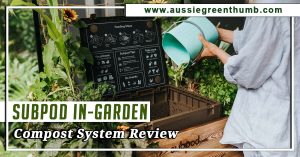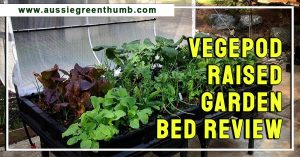Rooting hormone might sound like something that gardeners use to show off but it is, in fact, an important part of any garden tool kit. Rooting hormone powder and gel are both excellent tools for supporting the development of cuttings and, to a lesser extent, for supporting new root development when re-potting and planting young plants into the garden.
Because rooting hormone is, admittedly, a bit of a tricky subject, I’m going to spend some time exploring how rooting hormone works, as well as considering what type of rooting hormone is most effective.
Keep reading for everything you need to know about rooting hormones.
More...
Top Pick

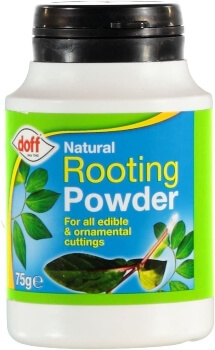
Premium Choice


Best Value

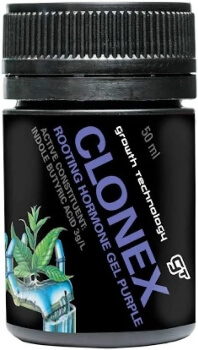
Product | Our Rating | Price | |
|---|---|---|---|
1. Doff Natural Rooting Powder |  |  | |
2. MYCO+ Super-Premium Root Inoculant | 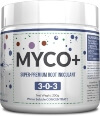 |  | |
3. Clonex Rooting Hormone Purple Gel | 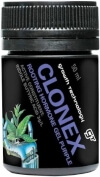 |  | |
4. Garden Safe TakeRoot Rooting Hormone | 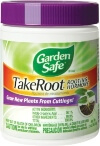 | ||
5. Hormex Vitamin B1 Rooting Hormone Concentrate | 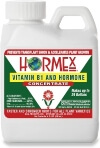 |
Buyer’s Guide to Rooting Hormone
What is Rooting Hormone Used For?
Rooting hormone is primarily used to support the development of roots in cuttings of all types but, like mycorrhizal fungi, it can be used as a diluted hormone supplement when planting bare-root plants.
In basic terms; most plants have the ability to change the purpose of their cells from those that move nutrients and water, to those that absorb and process them. Around the nodes, where leaves attach to a stem, there are highly concentrated hormones, packed around cells that are capable of changing form. Rooting hormone encourages that process.
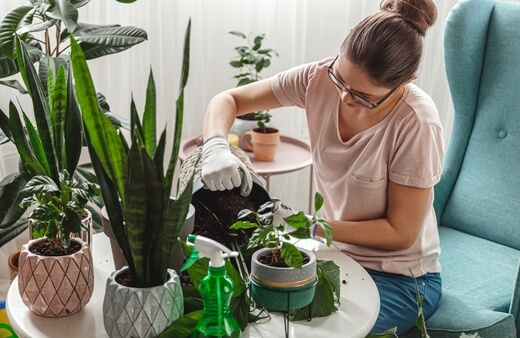
What is Rooting Hormone Made From?
There are quite a few different hormones that can be used in rooting hormones, and different hormones have slightly different applications.The most common rooting hormone, in both gel and powder form, is auxin, which naturally triggers auxin production within plants leading to the development of new roots from cut nodes.
Importantly though, indolebutyric acid (IBA) supports the uptakes of nutrients and encourages the plant to believe its in a hospitable environment, like all acids in low quantities.
Some more expensive rooting hormones contain Naphthalene acetic acid, which also helps to prevent fungal problems and mould in cuttings by sterilising the base of the cutting.
What to Look for When Buying Rooting Hormone
There’s not a massive amount of difference between rooting hormones, but there are some things worth looking out for. For example, NPK is virtually meaningless on rooting hormone, as cuttings are incapable of taking up nutrients until they root.
In fact, most cuttings are better off with a zero nutrient hormone as they can suffer from nutrient burn as young plants. Equally, the difference between gel and powder is far more about how you use rooting hormone than about its efficacy.
So, let’s take a look at the important factors to look for in rooting hormones.
Composition
Auxin is a naturally occurring hormone but can be synthesised. Most rooting hormones are from synthesised auxins - these are more effective. In nature, one of the easiest ways to find auxin is in dog saliva. Even human saliva contains tiny traces of auxin!
The acid in rooting powder and gel is important for sterilising your cuttings, as well as supporting low-level nutrient uptake from either water or sterile soil and vermiculite.
Suggested Plants
Some rooting hormones will have suggested plants which they are more effective for. The powder is more multi-purpose and can be used in small amounts when rubbed onto the roots of seedlings and bare root plants (similarly to mycorrhizal fungi).
The gel is easier to use for cuttings and to mix into water to treat the soil around bare root plants after planting.
Different Types of Rooting Hormone
Personally, I prefer rooting powder for almost every rooting application, for one simple reason; rooting gel smells awful! But I do use both, depending on the type of cutting and how I intend to treat it.
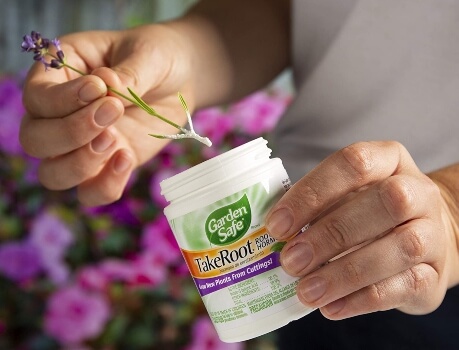
Source: amazon.com.au
Rooting Powder
There are a few obvious scenarios where rooting powder is more appropriate than gel. Rooting powder is great for rubbing (in small amounts) onto the roots of young seedlings, and onto the outer root ball of young plants before they are planted into the soil.
For cuttings taken, and then grown-on in soil or vermiculite, the rooting powder is harder to control but easy to apply when the cutting is dabbed in water first.
Rooting Gel
Rooting gel is easier to use than rooting power, as it sticks directly to cuttings, and works for rooted cuttings in water, as well as in soil or vermiculite.
The obvious downside to rooting gel is that it can have a particularly sulphurous smell, which is really quite off putting.
How to Use Rooting Hormones
Using rooting hormones is really quite simple. There are guides given on packaging as to how much to use, but in reality, just dipping your cutting directly into the gel or powder will usually coat it with exactly the right amount.
To help with longevity of the hormone in its container, it's worth scooping a little out, rather than dipping cuttings into the pot directly, which can contaminate it over time.
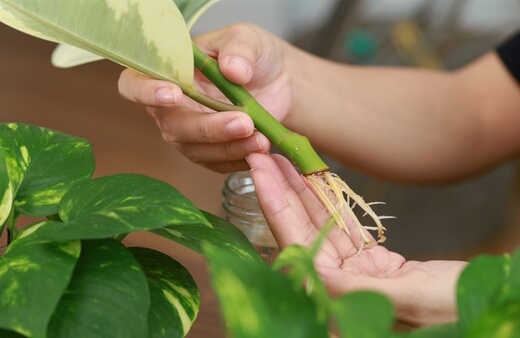
Using Rooting Hormone on Cuttings
To support the development of new roots on greenwood and hardwood cuttings, dip the cut end of each cutting in hormone and then immediately place it into your chosen planting medium (sterile soil, vermiculite, or water depending on the plant).
For cuttings going into soil or vermiculite, gel or powder will both work. For cuttings in water, use rooting gel as it will stick to the cutting, and if it does dissolve, it is more readily available to your cutting through the water than powder which is less soluble - tending to sink to the bottom.
How to Use Rooting Hormone on Young Plants
For young plants with bare roots, pricked out from their seedling pots, a very small sprinkle of rooting powder can help them to establish in their new homes, and reduce the chance of fungal problems or transplant shock.
Rooting hormones that contain Naphthalene acetic acid are particularly good for transplanting seedlings, as the acid helps to stabilise their conditions, and prevents fungal problems and nutrient burn, while simultaneously promoting root growth, which can later focus on nutrient uptake.
Using Rooting Hormone on Trees and Hedging
Bareroot trees and hedges should always be treated with rooting powder or mycorrhizal fungi before planting into the ground. While mycorrhizal fungi is the most effective product for this, if you have rooting powder in the shed, a very small amount, sprinkled over the roots, will gently encourage fresh roots to establish in their new home.
Reviews of the Best Rooting Hormones
1. Doff Natural Rooting Powder
Doff’s natural rooting powder is a brilliant all-rounder, with no chemical additives and a fully natural, organic, ingredient list. For edible plants, using organic and natural rooting hormones is strongly advised.
While chemical or synthetic rooting hormone won’t affect your crop’s viability, it can affect flavour, particularly for leaf crops, so Doff’s rooting hormone powder is the perfect choice!
Pros
Cons
2. MYCO+ Super-Premium Root Inoculant

Source: amazon.com.au
MYCO+ is produced by Element Nutrients, a company dedicated to making the very best rooting hormones and soil additives for hydroponics. However, everything that makes this soluble rooting hormone perfect for hydroponics, makes it great for standard rooting too.
It’s best used in water, but can be applied directly as a rooting gel to cuttings without the need for dilution.
For more on hydroponics, refer to our comprehensive guide for beginners here.
Pros
Cons
3. Clonex Rooting Hormone Purple Gel

Source: amazon.com.au
Clonex is one of the most popular rooting gels for hydroponics, with a great price tag, and simple instructions. If you’re looking for basic rooting gels, then this should probably be your go to for any short lived plants or greenwood cuttings.
Clonex can be applied directly to cuttings, or mixed into water to treat soil. I’ve always found that it's best used directly onto plant material, before it's planted, either in water or vermiculite, where it remains fully potent for longer.
Pros
Cons
4. Garden Safe TakeRoot Rooting Hormone
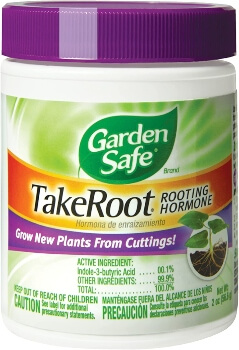
Source: amazon.com.au
Garden Safe might not exactly be a household name, but it’s one of the most affordable rooting hormones available, and it works. Garden Safe’s standard rooting hormone is in powdered form, odour free, and is incredibly simple to use.
Simply dip the end of your cutting in water and stir through the powder. Then shake the excess off and plant it! Keep in mind that a single, small, pot can produce hundreds of cuttings, so don’t go overboard on a massive pot that you’ll never get through!
Pros
Cons
5. Hormex Vitamin B1 Rooting Hormone Concentrate
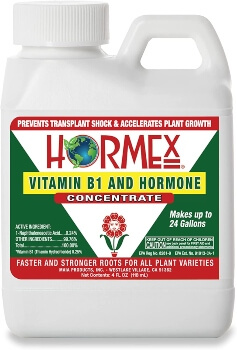
Source: amazon.com.au
Hormex is a lot of things, all at once, and can be used as a growth additive for mature transplants as well as fresh cuttings. It is a little bit complicated to use as each application requires a different concentration, but it’s generally advisable to dilute the hormone gel into water before use.
We’ve used Hormex a few times, and it does appear to work very well when used to water bare root plants into new planting holes.
Pros
Cons
Rooting Hormone Top Picks
Top Rated Rooting Hormone - Our Top Pick


Source: amazon.com.au
My go-to rooting hormone will always be Doff. Above everything else, it works, and it's pleasant to use, with none of the unpleasant odour of rooting gels.
This simple rooting powder is all-natural, and great for use on edible plants while fully supporting plants against transplant shock and the risk of fungal problems in moist cutting compost.
If you’re going to try rooting powder and want simple, quick results with herbaceous plants or edibles, definitely give Doff’s Natural Rooting Powder a go as it’s the perfect blend of value and effectiveness.
Premium Choice Rooting Hormone


Source: amazon.com.au
MYCO+ might be the most expensive rooting hormone we’ve ever come across, but it’s so easy to use across a wide range of applications and is nearly always effective.
While I wouldn’t suggest MYCO+ as a standard choice for basic cuttings, if you’re running hydroponics, or taking precious cuttings and clones in water, it's very, very, very worth it for the reassurance it gives.
Best Value Rooting Hormone


Source: amazon.com.au
The best-value rooting hormone on the market is Clonex by Growth Technology (not to be confused with Yates’ Clonex). It’s a specialist rooting gel for herbaceous plants and annuals that require rapid root development, so isn’t targeted at disease prevention, but we’ve never had any rot problems when using it and would highly recommend it to any gardener on a budget.
Rooting Hormone Frequently Asked Questions
What plants need rooting hormone?
Woody shrubs and trees should always have rooting hormones applied when you plant them. The same goes for roses and dahlias, which have a short window to root before they begin to degrade.
Find out more about how to grow and care for Dahlias by reading our in-depth guide here.
There are no plants that suffer as a result of using rooting hormone, so if you have it, it's always worth applying it to improve the odds of success.
What plants don’t need rooting hormones?
Some plants will root in almost all circumstances without the application of rooting hormone, but it can still speed things up. Mint and basil will root vigorously within a matter of days in plain tap water and are generally considered to be the easiest plants to root without hormones.
Some houseplants like monstera or devil’s ivy will also root vigorously after one or two weeks by themselves.
Is rooting hormone worth it?
Rooting hormone increases the success rate of cuttings by about 200%. Last year, we ran an experiment with climbing hydrangeas - a famously difficult plant to take cuttings from.
Of the six cuttings without hormone gel, two worked. Six other cuttings had rooting gel applied, and all of them worked.
How do you make DIY rooting hormones?
While you can’t synthesise auxin at home, there are some ways to improve the chances of successful cuttings with simple store cupboard ingredients. White vinegar and lemon juice can help to sterilise cuttings before planting, which reduces the risk of rot, mould, and fungal problems.
A gentler option is human saliva, so (if you’re not put off by the idea) licking the end of cuttings will gently sterilise them.
Boost Plant Propagation by Using the Best Rooting Hormones for 2024
While there are many plants that will root in water without the need for rooting hormone, there are no plants that do not benefit from it. Just because rooting hormone isn’t a necessity, doesn’t mean you shouldn’t use it.
Personally, I swear by it, even for simple cuttings like mint, which root faster, and are ready for planting out sooner when rooting hormone is used.
For woody plants like rosemary, or greenwood from fruit trees, rooting hormone is the only way to guarantee successful cuttings. But, whatever your opinion is on rooting hormone, I firmly recommend considering trying out powder first, so you’re not put off by the odour of rooting gel!
Published on October 26, 2022 by Gary Clarke
Last Updated on January 12, 2024


